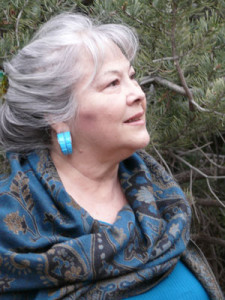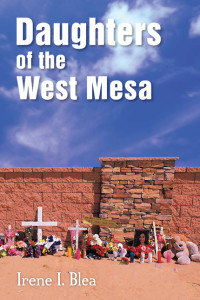This week The Latino Author is featuring published author Irene Blea . Our interview with the author provides some insight from a personal and professional point of view into the world of writing. You don’t want to miss it!

 Can you please share with our readers a little bit about your background, your life, or anything that you would like them to know about you?
Can you please share with our readers a little bit about your background, your life, or anything that you would like them to know about you?
I’m a native New Mexican, born on top and the north side of a mountain. My great-grandfather was the last one born in the Native American pueblo of Taos. We moved to a fruit orchard farm, then to the city. I entered school at the age of seven, Spanish-speaking, and learned English at the same time I learned course work material. I am the oldest of seven children. My father was a steelworker and an AFL/CIO union member. My mother was a homemaker. She is ninety-one years old and still lives alone.
Some of the first books that you published were in the textbook field. How long did it take you to write this type of book, and what type of process did you use?
Each book took, and still takes, about nine months. I began writing textbooks out of need, during a time when Chicano and Chicana Studies was fairly young. I could not find books adequate for use in my university classes. I voiced this frustration to the book salesman who came to my office, and him there was no need to visit me again. “What would you put in such a book,” he asked. I showed him my syllabus. He asked me to write him a letter telling him about my frustration and my need. That led to my first book, Toward a Chicano Social Science. I used my classroom syllabi as my outline on several others. The most difficult part were the references. Good references were hard to find. I spent much time refuting what I discovered in the writings theory of others. I became so discouraged doing this that I decided to write my own opinions and let others argue whether, or not, they agreed with me. After I retired I turned down an offer to write another textbook on behalf of writing fictionalized renditions of my family stories. What I like best is that I don’t have to reference.
Your writing is quite extensive in that you not only have written for an academic audience, but you have also written a trilogy, poetry, and more recently a historical novel based on a true story titled Daughters of the West Mesa. All of these require different structures when writing. Of all these various structures which is the most involved from your point of view and why?
They all provide their own challenges. None of them are extremely difficult for me because I was not aware, until this question, that they required different structures,LOL. However, the most difficult part was when I switched from writing nonfiction, to fiction. The difference between scientific writing and literary production was difficult to overcome; the learning curve of was steep for me. For example, I knew nothing about Point of View (POV), nothing about the structure and function of composing a hook, or sustaining action. I had to learn these things that I now enjoy so thoroughly.
You are now a retired professor from California State University – Los Angeles.Did your profession have an influence on your writing, and if so, how?
Being a university professor and administrator, influenced my work because one must publish to gain upward mobility in the university structure. This made me disciplined about writing, and highly aware that I needed to write about sexism and racism. Working and living in the LA area taught me a lot. Its diversity changed my worldview. I thought I knew Latinos because I am a highly trained Sociologist and researcher with areas of specialization in Race and Gender Relations. I loved learning how to be a better sociologist along with my students. I loved my LA experience. These two entities, sociology and LA, taught to now write with a broader perspective. I’ve also kept a journal since 1979, and I sometimes read my old entries. Some of them appear in spirit in my work.
As you entered the literary world what did you find as the most challenging? The writing, publishing, or the marketing part of the business? Please elaborate?
Having little or no help from some of the publishers in marketing my work has been difficult.In the end, authors need to market their own work. They need to know their market before they submit work for publication. This is not an option; it is a requirement that sometimes deters a first time author, but becomes easier as one gains experience. As I’ve stated above, it was making the transition from academic to literary writing that was the most difficult for me. Most challenging of all,once that change was made, was the lack of respect by mainstream publishers for Latina work. It is difficult to get published, but it is more difficult to get read. Mainstream publishers feel there is not a large market for our work, or they feel the market is highly limited, regional in nature, as if it is not American enough. I was once told, “Latinos don’t read.” On another occasion I heard, “Latinos don’t buy books.” I refuse to believe this. My work is read by a variety of people, but I’ve yet to find a mainstream publisher for my literary work. Then again, I may not be that good; but that is the issue: one loses self-confidence. In that loss is lost a huge amount of talented writers who could contribute greatly to the world.
When beginning a book, what steps would you recommend a writer takebefore embarking on this long and arduous journey?
Write what you know best, and research the rest. Do not allow images of difficulty to stop you. Write because you must. Set a time and place to write. Don’t give up. Your story may save someone’s life.
What motivates you to write?
I like people. I find them fascinating in their complexity; how they navigate through their lives. Some people do the strangest things, and strange things happen to others, yet they get through it with creativity. I marvel at this.
What is the one thing that most characterizes your writing?
Justice. I’ve been a civil and human rights activist since I was 18 years old. I strive for justice. While writing about the serial killings in Daughters of the West Mesa, I saw the victims, their families, and my community stereotyped and dehumanized in the media and in everyday conversation. Most of the community only knew the victims via the media as prostitutes and drug addicts. I heard several people, Latinos/Chicanos included, ask questions regarding the parents, “Where were the parents?” as if they the parents didn’t care. I got to know some of them. They cared. They filed missing person reports, they tried to get the media to help them find their loved one. I wanted to place a human face on them. It was the right thing be to do. I was once told, “Good luck in your ministry,” by a preacher. I realized that day in the early 1980’s, that my role was to help people to heal from racism and sexism; it is a calling.
How do you feel about ebooks vs. print books and alternative vs. conventional publishing?
I don’t read ebooks, but I applaud the advancements in technology because it introduces the younger generation to our work in a form to which they can relate. I like the feel of a book and a pen in my hand, setting the pen inside the book before I turn off the light at night. Books are tools to me. I write in the margins, unlined phrases, words I have not used for a long time, or have never used. I also write my thoughts and opinions in the margins; like, “hell no!” when I disagree strongly with the author. At age 69, I’m a bit old school. I’m also conscious of leaving my books for others to read. I want my granddaughter to know what her grandmother was thinking when she leafs through a book I’ve read.
Do you feel Latinos/Hispanics get a fair shake in the publishing industry? If not, please indicate some of the changes you feel need to be made in the business.
It is not always true that talent rises to the top. There are five or six main publishing houses left. They offer larger signing fees and royalties to a handful of authors. Thus, the majority of Latinos/ Hispanos are in a bind to get their work to the public. I am encouraged by smaller, independent presses, who can offer smaller royalties, but get Latinos/Chicanos published. Unfortunately, some of these are scams. I want to see more viable presses targeting Latinos and Chicanos, with larger royalties, and less of an investment from the author. Some authors have to pay to get published. I support this because it introduces an author to the public. This is not vanity; this is a political action. Smaller presses, however, need to broaden their marking strategies. Authors and publishers need to understand that, unlike some mainstream authors, to publish is a public action with political consequences for Latinos and Latinas.
If you haven’t already met him or her, what writer would you most like to meet and why?
Nobel Prize winner, Míguel García Márquez,who demonstrated no inhibition in his criticism of colonialism. García Márquezleft us the gift of his multifaceted work, which should be required reading. He did not find a nitch and rest. He was much more than a writer, but he kept writing and experimenting with writing techniques and media. I admire this. It is my hope my work will be translated and published in Spanish. Unfortunately, I am not a proficient writer in the Spanish language.
When it’s all said and done, what do you hope your writing will accomplish?
I want my life work to document women’s lives, to render testimony of their relationship to menand the general society in an effort to destroy sexism and racism. This does not make males my enemy; for there are many brave, self-assured, men who support women’s issues. As a civil and human rights activist striving for racial and gender equality, I maintain the characters in my novels, and the real people in my community, deserve this.
Moving forward, what projects are on the near horizon that you would like to share with our readers?
I am writing the third novel in my Suzannatrilogy. I was working on it prior to writing Daughters of the West Mesa, but Daughters of the West Mesademanded to be written. I resisted writing it but could not work on the third Suzanna novel until I was finished Daughters of the West Mesa. My experience with it was unique. I heard authors maintain they “had” to write a book, and didn’t believe it until it happened to me. I’ve had an interview with a producer documenting unsolved serial killings in the U.S. It should air on the A&E network in March or April of 2016. It is my hope this interview, my West Mesa novel, and it’s storyline about the discovery of 11 female remains and an unborn fetusdiscovered discarded in the desert keeps the unsolved serial killings in the forefront of the public mind. Someone knows who killed these women. I would love to see my books become movies for TV, but that is a bucket list item for another time and place.




